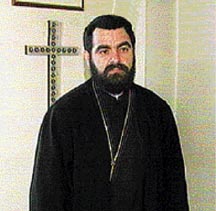The priest, the judge, the ring and the probe

Several judges, prosecutors and a priest are being investigated as possible members of a ring that rigged trials
A SWEEPING investigation of lower and appellate court judges and prosecutors has implicated a Greek Orthodox priest and has shaken the public trust in the Greek justice system.
The priest, Archimandrite Iakovos Giosakis, is suspected of involvement with an alleged ring that rigged court cases. Giosakis, no stranger to controversy, is also under investigation.
Greek Supreme Court prosecutors are carrying out a review of cases ranging from the freeing of charged drug dealers to insurance. In a number of the cases under review, the litigious priest himself was either plaintiff or defendant.
Greek state television reported that Giosakis flew to Lebanon on January 25, immediately after his bank accounts were ordered opened, and quoted sources close to the priest that he would return to Greece in ten days. No charges have yet been filed against Giosakis, and hence there are no legal restrictions on his movement.
Forty-three percent of Greeks said that they do not have trust in the criminal justice system, according to a Kappa Research poll conducted after the scandal broke out.
Widening investigation
Supreme Court prosecutor George Sanidas has ordered the opening of bank accounts in the Commercial Bank of Greece belonging to Giosakis, lower court prosecutor Antonia Ilia and chief lower court judge Leonidas Stathis.
Sources close to the case told the Athens News that the number of judges and prosecutors involved continues to grow. An appellate court deputy prosecutor, an appellate court prosecutor and a female appellate court judge are also currently under investigation in the case. It is believed that as many as ten judges could be expelled from the judiciary by the time the investigation is over.
Lower court judge Panagiota Tsevi-Raftopoulou is under investigation in two slander cases in which she ruled in Giosakis’ favour. The first was against Athens University theology professor Xenophon Papaharalambous and the other against Metropolitan Germanos of Ilia.
The ongoing probe is investigating whether three female judges, including Ilia, received bribes from Giosakis to rule in his favour in about ten cases, including the two slander suits.
Strange circumstances
Some of the facts and allegations the Supreme Court prosecutors must look into are, to put it mildly, bizarre.
For instance, Germanos reports receiving a prank call evidently designed to keep him out of court on the day of the Papaharalambous trial, in which he was a witness for the defence. The caller claimed that the French ambassador wanted to visit Germanos’ diocese on that day. When Germanos telephoned the number left by the caller, he found that it belonged to the office of a deputy prosecutor.
Giosakis sued Germanos after the latter wrote a letter advising Archbishop Christodoulos against the appointment of Giosakis in the powerful position of chief secretary of the synod. Giosakis was also a candidate to fill the influential position of head of the Apostoliki Diakonia (apostolic ministry).
Another curious allegation is that in several cases involving Giosakis, the judges who were initially chosen by lot were later replaced without explanation by judges now suspected of corruption.
Supreme Court Chief Justice George Kappos ordered an investigation against Tsevi, who judged the Germanos-Giosakis case, for alleged bias.
Never a dull moment
For over 15 years, the name Giosakis has spelled trouble in the ranks of the Greek Orthodox Church. In the late 1980s, the late metropolitan Panteleimon of Limnos appointed Giosakis as chancellor of his diocese. A rift between Giosakis and two other priests resulted in ousting of the metropolitan in 1989 after 39 years on the throne, following popular outcry.
Giosakis cared for Panteleimon in Athens for the remaining decade of the metropolitan’s life. A source at the Limnos diocese confirmed that Panteleimon had been suffering from Alzheimer’s disease even before the arrival of Giosakis. Giosakis obtained from the metropolitan a power of attorney, which enabled him to sell 11 prime pieces of property owned by the metropolitan between 1989 and 1993.
An employee at the Kranidi land registry confirmed the sales to this newspaper, which included six properties totalling almost four acres, a rural lot with a house and a seaside property in the Mandraki region of Ermioni.
Giosakis later went to the Diocese of Kithira, where he had served before going to Limnos. He was implicated in a scandal involving the theft of icons and a homosexual scandal that led to the resignation of the island’s metropolitan, Iakovos. Giosakis was never convicted of any crime.
The Greek Supreme Court is now seeking judicial assistance from the United States to investigate Giosakis’ activity in Chicago, where he repaired after the Kithira scandal. While serving at the Church of Saints Athanasios and John, which is under the jurisdiction of the Ecumenical Patriarchate, Giosakis was accused of having embezzled between $500,000 and $1 million, partly from the Philoptochos charity fund.
According to a church source, police confiscated Giosakis’ passport, but he managed to travel to Mexico, where patriarchal Metropolitan Athenagoras of Panama interceded with Greek consular authorities to issue a new passport. Athenagoras also issued a letter releasing Giosakis from his diocese and enabling him to be taken in later by Metropolitan Panteleimon of Attica.
Ecumenical Patriarch Vartholomeos issued a stern letter rebuking Athenagoras in 2002. According to church sources, Giosakis was about to be defrocked by the patriarchate when the powerful chief secretary of the patriarchal synod interceded on his behalf.

